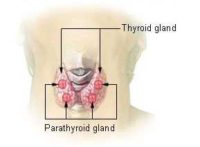Reduced Heart Rate Variability May Be Biomarker of Depression Risk
Does Exercise Slow Dementia?
Thyroid Inflammation Linked to Depression and Anxiety
 Teja Grömer PD Dr. med. Habil
Facharzt für Psychiatrie und Psychotherapie
Lehrbefugter der Universität Erlangen-Nürnberg im Fach Psychiatrie
Bamberg
MedicalResearch.com: What is the background for this study?
1) I had seen hundreds of clinical cases with combined depression and anxiety and noted end of 2015 that most (far more than 50%) from the subjective clinical impression were associated with autoimmune thyroiditis (AIT)
2) Autoimmune thyroiditis on the mental side leads to specific symptoms, exhaustion, tachycardia, restlessness.
3) I thus decided to do a systematic review and meta-analysis. (more…)
Teja Grömer PD Dr. med. Habil
Facharzt für Psychiatrie und Psychotherapie
Lehrbefugter der Universität Erlangen-Nürnberg im Fach Psychiatrie
Bamberg
MedicalResearch.com: What is the background for this study?
1) I had seen hundreds of clinical cases with combined depression and anxiety and noted end of 2015 that most (far more than 50%) from the subjective clinical impression were associated with autoimmune thyroiditis (AIT)
2) Autoimmune thyroiditis on the mental side leads to specific symptoms, exhaustion, tachycardia, restlessness.
3) I thus decided to do a systematic review and meta-analysis. (more…)Resistance Exercise Training May Alleviate Some Depressive Symptoms
 Mr. Brett R. Gordon, M.Sc.
Postgraduate researcher
Physical Education and Sport Sciences Department
University of Limerick, Ireland.
MedicalResearch.com: What is the background for this study? What are the main findings?
Response: Depression is prevalent, burdensome, and often comorbid mood disorder that is associated with other poor health outcomes. Exercise training interventions have demonstrated comparable efficacy for depressive symptoms to frontline treatments, such as antidepressant medications and behavioral therapies.
However, the evidence to date has primarily focused on findings from studies of aerobic exercise training like jogging, running, and cycling. Our work is the first quantitative summary of the effects of resistance exercise training (RET), or weight lifting and strength training, on depressive symptoms, and the influence of variables like participant characteristics, features of the RET, and the methods that were used in studies on the antidepressant effects of RET.
The main finding was that resistance exercise training significantly reduced depressive symptoms among adults regardless of their health status, the total prescribed volume of RET (e.g., how much the participants were supposed to exercise), or whether or not strength was significantly improved by the RET intervention. (more…)
Mr. Brett R. Gordon, M.Sc.
Postgraduate researcher
Physical Education and Sport Sciences Department
University of Limerick, Ireland.
MedicalResearch.com: What is the background for this study? What are the main findings?
Response: Depression is prevalent, burdensome, and often comorbid mood disorder that is associated with other poor health outcomes. Exercise training interventions have demonstrated comparable efficacy for depressive symptoms to frontline treatments, such as antidepressant medications and behavioral therapies.
However, the evidence to date has primarily focused on findings from studies of aerobic exercise training like jogging, running, and cycling. Our work is the first quantitative summary of the effects of resistance exercise training (RET), or weight lifting and strength training, on depressive symptoms, and the influence of variables like participant characteristics, features of the RET, and the methods that were used in studies on the antidepressant effects of RET.
The main finding was that resistance exercise training significantly reduced depressive symptoms among adults regardless of their health status, the total prescribed volume of RET (e.g., how much the participants were supposed to exercise), or whether or not strength was significantly improved by the RET intervention. (more…)NICU Babies’ Parents at Risk For Depression
Over 2.5 Million US Kids Diagnosed With Anxiety and Depression
- Another mental, behavioral, or developmental disorder such as ADHD, learning disability, or speech or language problems
- School problems
- Parents who report high levels of stress and frustration with parenting
- Unmet medical and mental health service needs
Eating Disorders Raise Risk of Being Bullied
Phase 3 Trial of Cariprazine (Vraylar) Shows Promise in Bipolar Depression
Collaborative Heart Failure Care Did Not Reduce Hospitalizations or Mortality, But Reduced Depression and Fatigue
This study evaluated the effect of a team intervention, Collaborative Care to Alleviate Symptoms and Adjust to Illness, also called CASA, on several aspects of quality of life in 314 patients with heart failure. The patients, who received care at diverse health systems in Colorado, were randomized to receive usual care or usual care supplemented with the CASA intervention, which included a nurse and a social worker who collaborated with a primary care provider, cardiologist, and palliative care physician to address the patients’ needs.
The study found that the CASA intervention did not influence the primary outcome of heart failure health status, yet did improve patients’ depression and fatigue. CASA did not influence number of patient hospitalizations or mortality. (more…)
Acne Sufferers At Increased Risk of Depression
 Isabelle Vallerand, Ph.D.
Epidemiologist, MD Student
Dept. of Community Health Sciences
Cumming School of Medicine
University of Calgary
MedicalResearch.com: What is the background for this study? What are the main findings?
Response: Over the past few years, there have been numerous reports that an acne drug called isotretinoin (Accutane) has been linked to psychiatric disorders. We recently published a systematic review on this topic and did not find an increased risk of psychiatric disorders among people treated with isotretinoin, so we wondered if acne itself may be contributing to mental illness. While it is well known that acne can have negative effects on mood, we wanted to assess if there was an increased risk of true clinical depression using medical records data.
Therefore, we conducted the current study and found that acne increased the risk of developing clinical depression by 63% in the first year following an acne diagnosis and that this risk remained elevated for 5 years after the initial acne diagnosis.
(more…)
Isabelle Vallerand, Ph.D.
Epidemiologist, MD Student
Dept. of Community Health Sciences
Cumming School of Medicine
University of Calgary
MedicalResearch.com: What is the background for this study? What are the main findings?
Response: Over the past few years, there have been numerous reports that an acne drug called isotretinoin (Accutane) has been linked to psychiatric disorders. We recently published a systematic review on this topic and did not find an increased risk of psychiatric disorders among people treated with isotretinoin, so we wondered if acne itself may be contributing to mental illness. While it is well known that acne can have negative effects on mood, we wanted to assess if there was an increased risk of true clinical depression using medical records data.
Therefore, we conducted the current study and found that acne increased the risk of developing clinical depression by 63% in the first year following an acne diagnosis and that this risk remained elevated for 5 years after the initial acne diagnosis.
(more…)